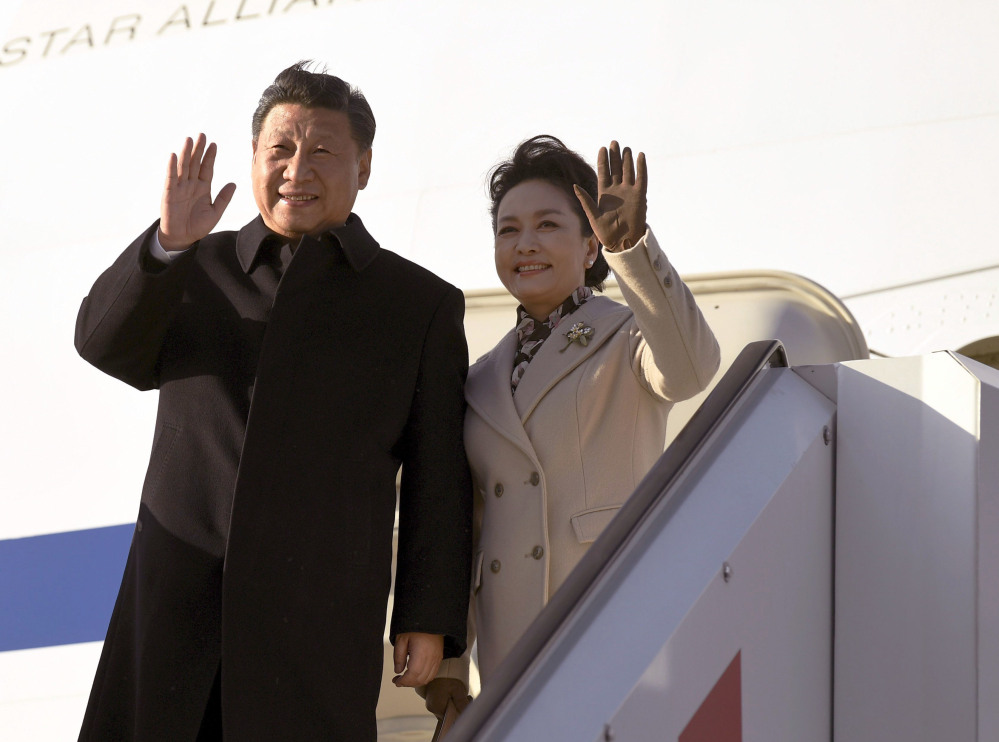President Trump’s retrenchment of U.S. global leadership on issues such as free trade, climate change and multilateral alliances has opened the door for an unlikely rival to assert itself – China.
Since Trump’s unexpected victory in November, Chinese President Xi Jinping has moved to position his fast-developing nation as a defender of globalization, and he has accelerated Beijing’s challenge to U.S. primacy in Asia.
This budding shift of power dynamics has alarmed U.S. allies and partners in the region and raised the stakes as Trump prepares to welcome Xi for a two-day summit starting Thursday at his Mar-a-Lago estate in South Florida. The two are expected to discuss a wide range of issues, including North Korea’s mounting nuclear threat and a lopsided trade imbalance in China’s favor, in what aides called a meeting aimed at establishing a working relationship.
Administration officials told reporters Tuesday that Trump will exhort Xi about the “urgent” need to exert more economic pressure on Pyongyang to curb its nuclear and ballistic missile testing, as U.S. patience with North Korea has been exhausted after it turned down opportunities to join the “community of nations.”
“The clock has now run out, and all options are on the table for us,” one official said of North Korea.
TRADE SANCTION THREAT
In an interview last weekend with the Financial Times, Trump suggested he would consider using the threat of trade sanctions as leverage to persuade Beijing to act with regard to Pyongyang.
“If China is not going to solve the problem, we will,” the president said. Speaking to business leaders in Washington on Tuesday, Trump said he had “a lot of respect” for Xi, but he emphasized China must do more to open its markets to U.S. companies. “We have to do better,” Trump said.
More broadly, however, the Trump administration has not developed or publicly enunciated a coherent policy to deal with China’s growing economic and military clout. And Trump, who called China a currency manipulator during his campaign, has delivered mixed messages on how far he is willing to go to confront Beijing.
For example, Trump angered Chinese leaders by accepting a congratulatory phone call from Taiwan’s president after the election and questioning the United States’ commitment to the “one China” policy that has undergirded the bilateral relations for decades. But, after Xi reportedly gave him the silent treatment, Trump agreed to honor the policy during a phone call.
The summit comes as Trump’s administration has yet to fill leadership positions across government agencies, including the State Department and Pentagon, leading foreign policy analysts to fret that the Mar-a-Lago meeting is premature.
White House aides said the summit is intended as a more informal affair similar to Japanese Prime Minister Shinzo Abe’s visit to Mar-a-Lago in February, although Xi, unlike Abe, will have no session with Trump at the White House.
Xi also is not expected to play golf with Trump in Florida as Abe did. Rather, the two men, and their wives, will spend about 24 hours together, including a dinner Thursday and working lunch Friday, White House officials said.
“Since there’s no China policy we can discern, the question arises, ‘On what basis is the president going to enter this talk?’ Who the hell knows,” said Robert Blackwill, who served as U.S. ambassador to India during the George W. Bush administration.
In 2015, Blackwill co-authored a paper, widely read in Washington, calling for a new “grand strategy” aimed at containing China’s rise.
DANGEROUS TO BE EXTEMPORANEOUS
“It is very dangerous for presidents to be utterly extemporaneous in their interactions with major powers,” said Blackwill, now a senior fellow at the Council on Foreign Relations. “Contrast that with the Chinese. Do we think that Xi Jinping will come to the meeting with a very clear set of strategic objectives and strategies? Absolutely.”
Analysts said Xi, mindful of Trump’s campaign rhetoric, will seek to soothe his concerns and tout increased Chinese investment in the United States – a tactic also employed by Japan’s Abe.
At the same time, Xi is expected to pursue his strategy of establishing China as a worthy rival to the United States in Asia. The Chinese leader, who took office in 2012, has sought buy-in from the United States for what he calls “a new model of great power relations.” It is Xi’s concept for a system in which the two countries avoid conflict by agreeing not to meddle in each other’s “core interests.”
The Obama administration, after initially echoing the phrase, quickly reversed course as China moved to expand its influence through an Asia trade pact that excluded the United States, an infrastructure development bank for Asian nations and provocative maritime operations in the East China Sea and South China Sea.
Last month, however, Secretary of State Rex Tillerson raised eyebrows during a visit to Beijing when he appeared to endorse Xi’s vision by parroting some of the language used by Chinese leaders.
Copy the Story LinkSend questions/comments to the editors.



Success. Please wait for the page to reload. If the page does not reload within 5 seconds, please refresh the page.
Enter your email and password to access comments.
Hi, to comment on stories you must . This profile is in addition to your subscription and website login.
Already have a commenting profile? .
Invalid username/password.
Please check your email to confirm and complete your registration.
Only subscribers are eligible to post comments. Please subscribe or login first for digital access. Here’s why.
Use the form below to reset your password. When you've submitted your account email, we will send an email with a reset code.